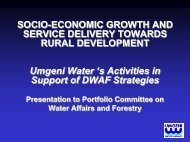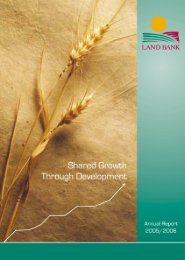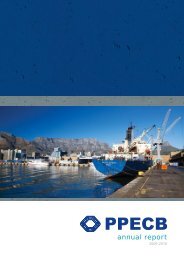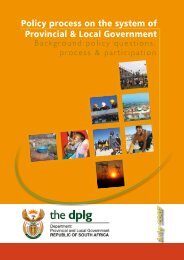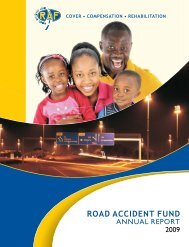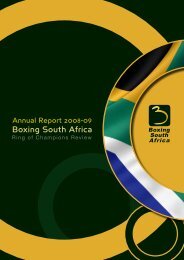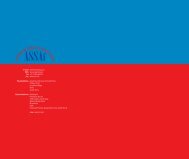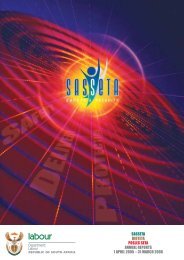Human Settlements Review - Parliamentary Monitoring Group
Human Settlements Review - Parliamentary Monitoring Group
Human Settlements Review - Parliamentary Monitoring Group
You also want an ePaper? Increase the reach of your titles
YUMPU automatically turns print PDFs into web optimized ePapers that Google loves.
<strong>Human</strong> <strong>Settlements</strong> <strong>Review</strong>, Volume 1, Number 1, 2010<br />
Bank Cities and Climate Change Report 2010,<br />
the UNEP 2010 Green Economy report, the UN<br />
Habitat State of Cities Report 2008, the 2010<br />
State of the World report by the Worldwatch<br />
Institute for example “Transforming Cultures<br />
– From Consumerism to Sustainability”, or<br />
national level studies such as South Africa’s<br />
Environmental Outlook’ in 2007 , to name<br />
a few, all return the same message - that<br />
we are mining our natural capital, that we<br />
are compromising the future functioning of<br />
natural systems and that we are putting more<br />
and more people into vulnerable positions of<br />
compromised health, wellbeing and livelihoods<br />
.<br />
In 2006 the World Conservation Union’s<br />
(IUCN) ‘renowned thinkers group’ stated that<br />
“Evidence is that the global human enterprise<br />
is rapidly becoming less sustainable, not<br />
more”.<br />
By all accounts then the planet is in a growing<br />
ecological deficit and we absolutely need new<br />
approaches, we need to be changing course,<br />
changing mindsets, and changing measures.<br />
As so eloquently expressed by Kofi Annan,<br />
then Secretary of the UN at the 2002 World<br />
Summit on Sustainable Development, ”…<br />
and let us face an uncomfortable truth: the<br />
model of development we are accustomed<br />
to had been fruitful for the few, but flawed for<br />
the many. A path to prosperity that ravages<br />
the environment and leaves the majority of<br />
humankind behind in squalor will soon prove to<br />
be a dead-end road for everyone.” (as quoted<br />
in King, 2009: 1)<br />
American author and environmental activist<br />
Derrick Jensen states that the fundamental<br />
truth of our time is that our dominant western<br />
culture is killing the planet. Further he<br />
maintains that we can quibble all we want –<br />
about whether it is killing the planet or merely<br />
causing one of the six or seven greatest mass<br />
extinctions in the past several billion years, but<br />
no reasonable person can argue that industrial<br />
civilization is not grievously injuring life on<br />
Earth (Jensen, 2010).<br />
What then, is the ultimate goal of striving for<br />
‘sustainable development’ It must surely be<br />
human wellbeing, because it is only when the<br />
majority of people alive at any point in time<br />
are satisfied with their lot, that the planet will<br />
be adequately taken care of and will in turn,<br />
provide adequate underpinning ecosystem<br />
services for humankind.<br />
Changes in worldviews, institutions and<br />
technologies will be necessary not only to<br />
achieve lifestyles that are better adapted to<br />
today’s ‘full world’ context (Costanza et al.,<br />
2010) but to achieve life and survivability for<br />
many. Adam Kahane expands on this idea of<br />
a full world and states that “the fullness of our<br />
world produces a threefold complexity. We can<br />
pretend that we are independent and that what<br />
we do does not affect others (and what others<br />
do does not affect us), but this is not true.<br />
We can pretend that everybody see things<br />
the same way, or that our differences can be<br />
resolved purely through market or political or<br />
legal competition, but this is not true. And we<br />
can pretend that we can do things the way we<br />
always have, or that we can first figure out and<br />
then execute the correct answer, but this is not<br />
true (Kahane, 2010:5).<br />
121



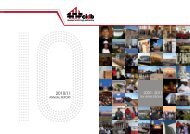
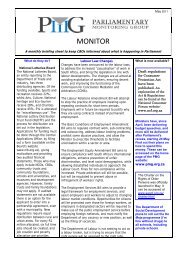
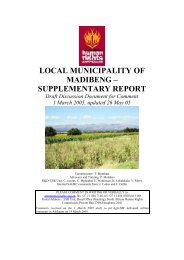
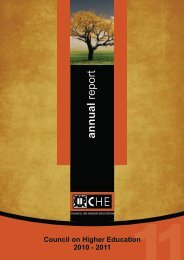
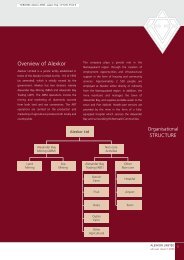
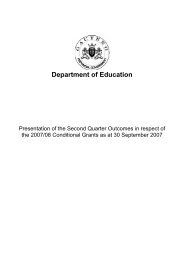
![National Research Foundation Annual Report 2008 / 2009 [Part 2]](https://img.yumpu.com/49774036/1/177x260/national-research-foundation-annual-report-2008-2009-part-2.jpg?quality=85)
